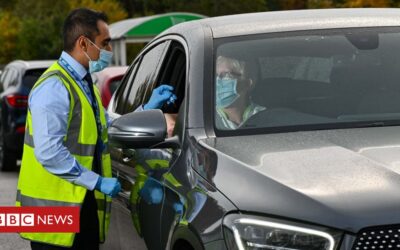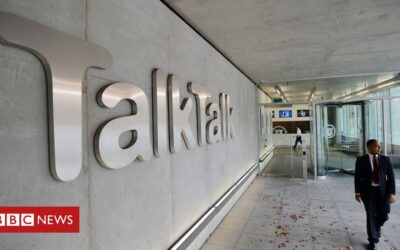Savile Row’s ‘suit-shaped gap for women’ Video, 00:01:57Savile Row’s ‘suit-shaped gap for women’
BBC Business News Articles
WTO to name first female boss as shortlist narrows
And then there were two.The selection of a new director general of the World Trade Organisation (WTO) is entering its final stage. The final two – from an initial list of eight candidates – are Nigeria’s former finance minister Ngozi Okonjo-Iweala and South Korean trade minister Yoo Myung-hee.Both are female which means that if members of the WTO can coalesce around one them in the final stages of selection, it will be the first time the job has been taken by a woman. Ms Okonjo-Iweala and Ms Yoo both have political and international experience and both were students at American universities.Ms Okonjo-Iweala, who also has US nationality, has had two spells as finance minister and a short stint as foreign minister in Nigeria.Much of her career was spent as an economist at the World Bank. She eventually rose to the position of managing director, essentially second in command at the institution. She has been an unsuccessful candidate for the top job at the bank.She is currently chair of the board of the international vaccines alliance, Gavi.She has not spent her career immersed in the details of trade policy as some other candidates did. But her work as a development economist and finance minister means she has often had to deal with international trade. She describes trade as “a mission and a passion”. Ms Okonjo-Iweala would be the first African to be director general of the WTO.Ms Yoo is much more of a trade specialist. Her statement to the WTO’s general council hinted at a literal lifetime in the area – she said she was born the same year that South Korea acceded to the General Agreement on Tariffs and Trade, which became one of the key elements of the WTO’s rule book. She started her career in trade, she said, in the year the WTO was born, 1995. She has been involved in some of South Korea’s key trade negotiations in that period, including with China and the US. She makes a point of her “deep knowledge and insight into the details of various areas of trade agreements”.Under stressBoth candidates were keen to point out their abilities in bringing sides together in negotiations. That is a skill the successful candidate will have to draw on extensively.It is important to remember that a WTO director general can only make progress if they can get the member countries on board.It has been said that the DG has no executive power; that they are more like a butler announcing to the member countries) that dinner is served. But the WTO is an organisation under stress. Two of the biggest commercial powers on the planet – China and the US – are embroiled in bitter trade conflict. The US has some substantial concerns about the WTO. Many of them pre-date President Trump, but his administration has taken a less collaborative approach to pursuing them. The US has undermined the WTO’s ability to carry out one of its main functions – settling trade disputes between member countries.It has refused to allow the body which hears appeals to appoint new members, effectively judges. That reflects US concerns that the body’s judgements were going beyond the WTO rulebook. The US block has left it unable to take new appeal cases. It doesn’t mean the dispute settlement system doesn’t work at all, but it is seriously impaired.In terms of diversity, the WTO seems to be heading into new territory. It will, almost certainly, have a woman as Director General for the first time a woman.The regional representation might also break new ground, if the African candidate gets the job – there has been an Asian director general before, from Thailand. If all goes to plan we will know who it is by early November.
Asda launches 'first of its kind' flu jab service
Supermarket Asda has launched a free NHS drive-through flu jab service for eligible people at 13 UK stores.Anyone entitled to free jabs – such as the elderly, frontline NHS staff, and pregnant women – can use the service.People regarded as non-vulnerable can get jabs for £8, which Asda claims is the cheapest on the market.The drive-through jabs will be offered in Asda car parks, and come after reports people are put off visiting GPs and pharmacies due to Covid-19 worries.Asda says the initiative, which began on Thursday, is the first of its kind in the UK. But other retailers, including the Boots and Lloyds Pharmacy chemist chains, also offer jabs.The supermarket’s move comes amid news that flu jabs have been limited by pharmacists and health clinics due to high demand.However, NHS England says enough stocks are available. This year, up to 30 million people can be vaccinated in England, the government says.Maq Din, lead pharmacist at Asda Pharmacy, said: “The sad truth is that there is an increased mortality risk if you catch Covid-19 when you already have the flu.”We are putting a number of measures in place at our drive-through flu jab centres , so patients can be assured that it is safe to visit – and they won’t even need to leave their car to get a jab.Customers must pre-book, and will be given a time slot and a bay to park when turning up.Asda said its own research had shown that 28% of UK adults said they were currently putting off getting a flu jab over concerns about visiting GPs and pharmacies for fear of coming into contact with someone suffering from Covid-19.The booking procedure is:Find the nearest stores with a pharmacy using the store locator
Telephone the store for an appointment – it cannot be booked online
During the consultation over the phone, people will be given a time slot and detail
The service is available at these Asda stores: Accrington; Bodmin; Eastbourne; Gosport; Hartlepool; Hyde; Nuneaton; Old Kent Road (London); Oldbury; Pilsworth; Sheffield; South Shields; Wakefield Durkar.
TalkTalk share price surges 16% on takeover offer by Toscafund
Shares in telecoms firm TalkTalk have surged 16% after it agreed to consider a takeover bid from investment firm Toscafund that values it at £1.1bn.TalkTalk said that its board had “agreed to progress the proposal further” and would consult advisers.But it added that to make any firm bid, Toscafund would have to get the backing of TalkTalk chairman Charles Dunstone, who owns nearly 30% of the firm.Toscafund already has a similarly sized stake in the company.The offer is worth 97p a share, considerably less than a 135p-per-share offer that Toscafund reportedly made last year.
Covid: City firms look to cut office space amid pandemic
Many top City firms are thinking about how big their offices should be as staff continue to work mainly from home during the pandemic, a study indicates.According to a survey by the CBI and PwC, 74% of financial services firms are reviewing their office space needs.Of those, most are looking to either use space differently, get rid of it, or both.Other recent surveys suggest that more home working will become a permanent fixture for a majority of businesses.The government says people in England should work from home if they can.Last week, a survey of just under 1,000 firms by the Institute of Directors (IoD) showed that 74% plan on maintaining the increase in home working, while more than half plan on reducing their long-term use of workplaces.It followed a BBC survey in August which suggested that 50 of the biggest UK employers had no plans to return all staff to the office full-time in the near future.Coronavirus: Work from home ‘if you can’, Michael Gove saysOf the 133 firms polled in the CBI and PwC survey, 88% said there had been a shift to remote working, with half saying most of their staff could work from home.More than two-thirds of the firms were investing in their IT infrastructure, but overall, jobs were tipped to be cut back.’Ghost towns’A report by Cardiff and Southampton universities in August suggested that most people are as productive when working from home, if not more so.Given that the people working from home are among the most productive, “preventing them from choosing how they work in the future does not make economic sense,” said Prof Alan Felstead, of Cardiff University.However, the CBI warned in August of negative economic consequences from increased working from home, saying city centres could become “ghost towns” if office workers were not encouraged to go back.But the IoD survey suggested that home working driven by the pandemic was “here to stay”, with a significant minority of bosses saying working from home was more effective.
Final flight for British Airways' last two Heathrow-based Boeing 747 planes
British Airways’ last two Heathrow-based Boeing 747 planes have departed from the airport on their final flight.The jumbo jets left the west London airport shortly after 8.35am BST on Thursday, as more than 18,000 people watched a live stream of the event on Facebook.The airline brought forward the retirement of its fleet of 747-400 aircraft due to the impact of the Covid-19 pandemic on the aviation sector.
Covid in Scotland: Hospitality 'death knell' fears over new rules
New coronavirus restrictions will “sound the death knell” for some of Scotland’s hospitality business, industry leaders have warned.In central Scotland where the infection rate is highest, pubs and restaurants will close for more than two weeks. Elsewhere, hospitality venues will have reduced opening hours and be barred from selling alcohol inside. The Scottish government said businesses would receive an additional £40m of government support.The new temporary measures come into force at 18:00 tomorrow and are expected to last until 25 October.Pubs and restaurants will be closed in five health board areas – Greater Glasgow and Clyde, Lanarkshire, Forth Valley, Lothian and Ayrshire and Arran – where about 3.4 million people live.Elsewhere in Scotland, hospitality venues can open inside from 06:00 until 18:00 to sell soft drinks and food, and customers can be served alcohol in outside areas only until 22:00. First Minister Nicola Sturgeon warned that without such measures, by the end of October infections could return to the levels seen early on in the pandemic in March, prompting a more intense lockdown.She accepted the restrictions would be hard on businesses, especially as employers’ contributions to the furlough scheme have increased, but said £40m would be made available to support the sector.’Circle of madness’Many businesses and industry leaders, however, reacted with dismay, complaining of a lack of consultation and claiming that hospitality was being unfairly singled out.Carina Contini, who owns three restaurants in Edinburgh, said the restrictions were a “step too far”.She said: “Here we go again. We did it in March when we thought that was a once in a lifetime shock to our business, shock to our communities, and you know, are we in a circle of madness? Having to have a 16-day closure, three weekends, significant cashflow implications, but most importantly our team are in shock, we’re in shock.”Stephen Leckie, who runs the Crieff Hydro hotel, said he had 50 cancellations from customers within an hour following the first minister’s announcement.Mr Leckie, who is also chair of the Scottish Tourism Alliance, said the measures had caused confusion for business owners and customers.”This industry is in tatters, it’s in trouble and now there’s turmoil. We have questions to ask, many customers are asking questions and are cancelling in their droves.”Pub owner Michael McHugh said he was struggling to reassure his staff. Mr McHugh, who owns Alexander’s Bar in Clydebank, told the BBC: “I’m at the end of my tether now. “I’m finding it harder and harder to continually support my staff and say ‘don’t worry your jobs are safe’… how can you run a business when every other week you’re getting shut down?”Rules for the five health boards areasAll licensed premises – with the exception of hotels for residents – will be required to close indoors and outdoors, although takeaways will be permitted
Cafes which do not have an alcohol licence will be able to stay open until 18:00
Snooker and pool halls, indoor bowling alleys, casinos and bingo halls will also close in the five health board areas for two weeks from 10 October
Contact sports for people aged 18 and over will be suspended for the next two weeks – with an exception for professional sports
Indoor group exercise activities will not be allowed, although the current rules will remain in place for under 18s and gyms can remain open for individual exercise
Outdoor live events will not be permitted for the next fortnight.
There will be no travel ban in any of the areas, but people in the central belt have been urged to avoid public transport unless it is “absolutely necessary”.And they have also been advised not to travel outside of the health board area they live in if they do not need to.Rules for the rest of ScotlandPubs, restaurants and cafes are being barred from selling alcohol indoors from 18:00 on Friday until 25 October
They can open inside from 06:00 until 18:00 to sell soft drinks and food
They will be able to sell alcohol for outside areas until 22:00
Liz Cameron, chief executive of the Scottish Chambers of Commerce, said: “These measures will sound the death knell for businesses across the hospitality sector, especially pubs and bars.”Restaurants and hotels, whilst remaining open, will also be constrained on what they can provide and this will place a large dent in their already reduced income.”She said redundancies could rise as a result of the measures.Stephen Montgomery of the Scottish Hospitality Group, which represents several restaurant and bar groups, said: “The first minister has effectively signed a death sentence for many businesses across the Scottish hospitality industry.”He added there would be a “catastrophic” economic cost.But Deputy First Minister John Swinney told Good Morning Scotland that an evidence report published on Wednesday had shown the “areas of difficulty” where the virus was spreading.He said information gathered from contact tracers showed there were “two principle areas of difficulty”. “The first is about household transmission, which is why two weeks ago we put in place the constraints that said people could not visit other households indoors and, secondly, spread within the hospitality sector. “We regrettably have had to take the decision that we have taken because we have to take action to stop the opportunities for interaction where the virus can spread.”Changes to shopsShops across Scotland will be asked to return to 2m physical distancing from this weekend, and to reintroduce measures such as one-way systems.David Lonsdale, Scottish Retail Consortium director, said many businesses would be baffled at the request “in the absence of any evidence which shows shops are a source of infection”.He added: “These additional restrictions may make it impractical for some to trade at all for this period, and the government must urgently provide details of the proposed support for these viable businesses.”‘Full support’Many public health experts, however, backed the changes and said they were a necessary step.Gabe Docherty, chairman of the Scottish Directors of Public Health, said: “The measures announced by the first minister today focused on those areas which are associated with increased risk of transmission, and have the full support of the Scottish Directors of Public Health. “The accelerating number of cases in a number of NHS Boards demonstrates the need for immediate action to halt the spread we’ve seen in these areas over past few weeks, and the potential for further transmission across wider parts of Scotland. “Taking action now to restrict the spread of Covid in our communities will save lives, help protect our NHS, and – as we begin to see a reduction in transmission – avoid the need for more extensive restrictions.” Use the form below to send us your questions and we could be in touch.In some cases your question will be published, displaying your name, age and location as you provide it, unless you state otherwise. Your contact details will never be published. Please ensure you have read the terms and conditions.
If you are reading this page on the BBC News app, you will need to visit the mobile version of the BBC website to submit your question on this topic.
EasyJet warns of heavy losses and continuing flight cuts
EasyJet has warned it faces losses of more than £800m this year and that it expects to fly at just 25% of normal capacity into next year.Although the airline said in a trading update it had taken tough action to cut costs, the warning underlines the continuing challenges for the industry.Sky News has reported that EasyJet has signalled to the government that it may need more financial support.There was no reference about needing state aid in the trading statement.However, chief executive Johan Lundgren said: “Aviation continues to face the most severe threat in its history and the UK government urgently needs to step up with a bespoke package of measures to ensure airlines are able to support economic recovery when it comes.”The airline said it expected to sink into a pre-tax loss of between £815m and £845m in the current financial year, which is worse than analysts’ forecasts of a £794m loss. It would be the first time in EasyJet’s 25-year history it has not made an annual profit.The carrier has already taken a £600m loan from the government, cut 4,500 jobs, raised £608m from selling aircraft and tapped shareholders for £419m.EasyJet’s statement said it would “continue to review its liquidity position on a regular basis and will continue to assess further funding opportunities, including sale and lease backs, should the need arise”.The airline will formally report its annual results on 17 November.
Film-going could 'become extinct' warns director
Wonder Woman director Patty Jenkins has said that movie-going is facing a real threat of extinction.Her new superhero movie has been delayed three times during the coronavirus pandemic.She is among dozens of top Hollywood directors appealing to the US government to provide a financial lifeline to cinemas. Ms Jenkins’s warning comes as cinemas in the UK are also struggling with a recent spate of delayed film releases.”If we shut this down, this will not be a reversible process,” she said in an interview with Reuters news agency. “We could lose movie theatre-going forever.”Cinemas across the world are struggling financially with tough Covid-19 social restrictions limiting customers, along with a lack of blockbuster movies to attract them.In the US, the National Association of Theatre Owners said 69% of small and mid-sized cinema companies could be forced to file for bankruptcy or shut down permanently.America is the world’s biggest movie market in terms of box office revenues, with China catching up rapidly.Ms Jenkins said widespread closures would lead Hollywood studios to stop investing in films for cinemas, and turn to online streaming instead.”It could be the kind of thing that happened to the music industry,” she added. “Where you could crumble the entire industry by making it something that can’t be profitable.”Some of this year’s major Hollywood films, including Walt Disney’s Mulan, skipped cinemas and went straight to streaming. Ms Jenkins said that there is no option for her sequel, Wonder Woman 1984, to go straight to streaming.The superhero movie, starring Gal Gadot, is now scheduled for release on Christmas Day. That is a delay of six months from its original premiere date in June.
Media playback is unsupported on your device
More delaysLast week it was announced that the release of the new James Bond film has been delayed again.The premiere of No Time To Die had already been moved from April to November because of the pandemic. It is now scheduled for April 2021.Blockbuster remake Dune has also seen its release date delayed. The Warner Bros sci-fi epic was due for release in December but has been been pushed back to October 2021.Warner Bros has also delayed The Batman, now due in March 2022.In the UK, Odeon is cutting the opening hours for some of its cinemas to weekends only because of delays to new film releases.The chain, which operates 120 theatres, said it will affect a quarter of its cinemas, which will now open between Friday and Sunday.It comes as Cineworld said it will temporarily close its UK and US venues, affecting 45,000 jobs.
Four years and counting: The epic China-US takeover
Sharp exchanges in US vice-presidential clashKamala Harris calls the US response to the virus “the greatest failure” of any president in history.










